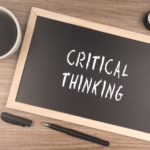
Taking Charge of Conflict: 4 Ways to Start from Within
Do you feel society is becoming more divisive than ever? Are you tired of conflict souring the mood at home or in the workplace? Neuroscience sheds light on why conflict goes hand in hand with the human experience—and what we can do about it.
Because human beings have emotions, we act and react in ways that clash with others’ emotions, creating a chain of responses that result in conflict. These so-called maladaptive behaviors make cooperation and collaboration extremely difficult, even in smaller, closer circles.
There is no easy answer to conflict in society. The good news is that we can make a difference if we start small—with ourselves. In fact, when we work on our own emotional intelligence in the context of our families and friends, we can reduce conflict on a smaller scale, with a ripple effect on the larger community.
Emotional Intelligence
 What is emotional intelligence? It is the ability to manage our emotions while being aware of how our words and actions affect those we interact with. Our emotional intelligence defines how we react to one another, which ultimately determines how well we cooperate with others, whether in the home, the workplace, or the community. At the same time, emotionally intelligent people make decisions based on both their own needs and the needs of others—a balanced approach. By learning to respond to situations in a way that honors both our emotions and those of the people around us, we can reduce conflict within ourselves, our families, and our communities.
What is emotional intelligence? It is the ability to manage our emotions while being aware of how our words and actions affect those we interact with. Our emotional intelligence defines how we react to one another, which ultimately determines how well we cooperate with others, whether in the home, the workplace, or the community. At the same time, emotionally intelligent people make decisions based on both their own needs and the needs of others—a balanced approach. By learning to respond to situations in a way that honors both our emotions and those of the people around us, we can reduce conflict within ourselves, our families, and our communities.
Self-compassion
Emotional intelligence starts with us: We need to understand ourselves. We need to address our internal conflict, because the better we feel about ourselves, the more easily we are able to understand others’ emotions and cooperate for a mutually good outcome.
Self-compassion teaches us to give ourselves grace for our human failings. It’s not easy to get back up after we fall; it’s not easy to take failure as an opportunity to do better rather than a reason to beat ourselves up over something we wish we hadn’t said or done. But when we acknowledge that our imperfections are simply a part of who we are, we are able to do just that. We can walk forward without fear of failure because we know that we are not perfect but that every event and interaction can be a learning experience, even if it doesn’t go the way we might have hoped.
This self-courage means we won’t hold back in approaching and interacting with others when the encounter might be difficult or potentially awkward—an important first step in addressing a divisive situation or relationship. It also means we’ll use past failings as a guideline to do differently the next time. Both skills are key to resolving conflict because they change how we conduct relationships.
Empathy
Once we’ve learned to extend compassion to ourselves, we’re better equipped to do the same to others. Empathy takes the same skills we developed through self-compassion and extends them to those we interact with. With empathy, we may not agree with the words, beliefs, or actions of those around us, but we try to understand where they’re coming from and what might have caused them to respond in a particular way. We view their perspective for what it is, without judgment. Then we are better able to respond in a way that signals our respect and our acknowledgment of their concerns or fears, which is a must if we want to regain trust or maintain a cooperative, low-conflict relationship.
Critical Thinking
 If we have self compassion and know how to carry out encounters in a positive way, we are ready to tackle decisions that affect both ourselves and others. This can be an area particularly fraught with conflict, because sometimes what solution is best for one person or group isn’t good for another. We have to ask which solution is the most workable within the circumstances—and how to communicate that to everyone involved. This requires critical thinking, the ability to look at all sides and make the decision that will provide the greatest benefit—and the lowest risk of conflict.
If we have self compassion and know how to carry out encounters in a positive way, we are ready to tackle decisions that affect both ourselves and others. This can be an area particularly fraught with conflict, because sometimes what solution is best for one person or group isn’t good for another. We have to ask which solution is the most workable within the circumstances—and how to communicate that to everyone involved. This requires critical thinking, the ability to look at all sides and make the decision that will provide the greatest benefit—and the lowest risk of conflict.
Because humans are emotions-driven beings, conflict is inevitable. And in some cases, even if we apply our emotional intelligence to a tense situation or relationship, we can’t avoid conflict altogether. But if we master these skills, we will be better equipped to respond in a way that, over the longer term, shows our good faith, which makes future collaboration a possibility even if the circumstances now don’t allow it.